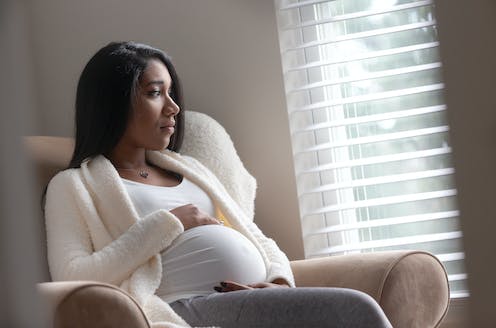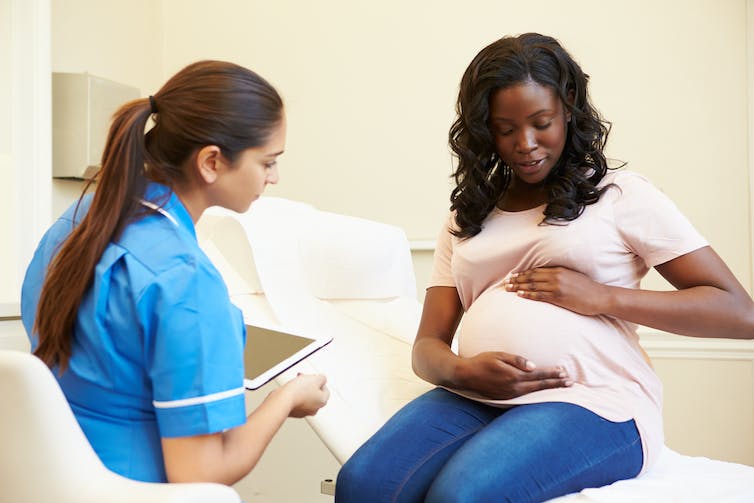
Black women are four times more likely to die while pregnant or just after childbirth than white women, according to the latest figures published by Mbrrace – a national programme which surveys and investigates the causes of maternal deaths and infant deaths in the UK. Although this report only includes data from 2019-2021, reports from previous years show maternal mortality rates have been largely unchanged for the last decade or more.
The reason for this racial disparity still isn’t fully understood. It’s likely due to a combination of many factors, including socioeconomic status and pre-existing health conditions. Numerous reports have also shown that black women receive poorer maternity care compared with women from other ethnic backgrounds, which may further contribute to poorer health outcomes.
But in order to improve maternal outcomes for black women, work will need to be done at every level of the NHS to fix a root cause of these racial disparities in care – a concept philosophers call epistemic injustice.
Epistemic injustice is defined as unfairly preventing someone from properly communicating their ideas or making sense of their experiences. This typically happens when someone is biased against a person – for example, due to their race or social class. This leads to them to downplay the other person’s credibility.
Examples of this in maternity care include patients having concerns about their health and their pregnancy dismissed or treated as trivial, being passed off as “dramatic”, questions being brushed aside or not taken seriously, and practitioners not taking patients’ pain seriously. By denying someone credibility, it may make them feel less able to request care and raise worries.
Racial prejudice
Numerous studies have highlighted the ways that epistemic injustice is present in real-world healthcare settings. Often, racial prejudice is a root cause.
For example, research shows that white health workers are more likely to disbelieve reports of pain by black patients and less likely to provide them with proper pain relief, compared with white patients. Reports have also found that when black women raise health concerns, they’re often dismissed – even in severe cases, such as instances where c-section stitches are bleeding and infected.
A 2022 report by the Black Equity Organisation, which works to dismantle systemic racism in the UK, found that more than 65% of respondents reported they’d been discriminated against because of their ethnicity by healthcare professionals. The NHS Race and Health Observatory has made similar conclusions, showing many black patients experience patronising and judgemental attitudes from healthcare staff.

Monkey Business Images/Shutterstock
Knowledge gaps in healthcare research are another example of epistemic injustice. Black people have historically been underrepresented in research studies and continue to be so.
One reason for this may be their experiences of racism from doctors, which fosters distrust and discourages black people from participating in research studies. But researchers are also slow to engage with black participants and close these knowledge gaps. Many justify this lack of engagement on feeble grounds – for instance, by insisting black women are hard to recruit.
This lack of representation can lead to knowledge gaps at every level – including in the medical guidelines used to identify and diagnose certain diseases. Take the recent case of a black infant who was not diagnosed and treated for jaundice as quickly as she should have been. Although multiple blood tests showed high blood levels of bilirubin (a symptom of jaundice), healthcare staff were still relying on visual signs to detect jaundice – and these aren’t typically as evident in darker-skinned patients.
Although just one example, this highlights the way knowledge gaps make it harder for staff to understand the distinct care needs and experiences of black patients. This may lead to worse health outcomes for these patients, and further diminish levels of trust the black community has in healthcare practitioners and institutions.
Making change
While the negative impacts of epistemic injustice on the maternal healthcare that black women receive is clear, addressing these problems within the NHS will require change at nearly every level.
A report on black maternal health by the House of Commons’ Women & Equalities Committee, published in March 2023, suggests some measures are already being taken by Health Education England to improve cultural competence and address racism in maternal care. But training staff to improve “cultures of kindness” and to “listen and make sure women are heard” will not be enough to fully address the complex causes of these disparities in black maternal health.
Current NHS strategies such as hiring more diverse staff and rethinking research priorities are one step in the right direction. By having staff from more diverse backgrounds, there’s a greater likelihood they will be able to sympathise with patients and understand their experiences. Moreover, having more research which has included black patients will help healthcare staff better respond to the specific health needs of these patients.
But such strategies risk falling short if they are not explicitly aimed at targeting systemic racism and prejudice in the NHS.
For maternal mortality, midwifery training needs to directly challenge the racist stereotypes that drive some healthcare staff to deny the credibility of others’ testimonies. Gynaecology and obstetric researchers must proactively include black women in their studies to ensure their distinctive needs and concerns are met. This may in turn improve medical care for women from all backgrounds.
![]()
Ian James Kidd does not work for, consult, own shares in or receive funding from any company or organisation that would benefit from this article, and has disclosed no relevant affiliations beyond their academic appointment.




























